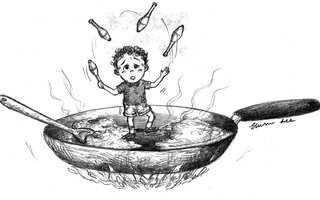
After graduating high school in Buenos Aires, Pili Mayora joined the El Coreto circus school to develop basic circus skills. Three years later, the conditioning has helped the field hockey standout in her play.
As if junior Pili Mayora wasn’t already distinct by being one of the few international students and athletes from Argentina, the field hockey athlete has another unique experience that makes her stand out even more: she joined circus school in Buenos Aires before coming to Harvard.
When Mayora graduated from high school in November of 2007, she was looking for something that would keep her busy until attending Harvard in the fall. Due to a different school calendar that runs from March to November in Argentina, Mayora had nine months of free time before coming to college. And with those nine months, she did what any recent high school graduate would do: she decided to go to circus school.
Students in America have decided to take unique gap year experiences before, but usually not something like this. Yet, this idea is not as crazy as it might sound at first. The trend of attending circus school has actually been growing in Argentina in recent years.
“The idea of attending circus school is becoming culturally important in Buenos Aires,” Mayora explains. “Actresses [in Argentina] recently started doing it for fun. They appear on TV and then teenagers say, ‘I want to do that.’”
And when Mayora was done juggling both school and field hockey, she viewed it as the perfect opportunity to jump on the bandwagon. She leaped at the chance to go to “El Coreto” Circus School, which focuses on teaching the arts of the circus in Buenos Aires. She attended the basic training program, in which performers learn all of the general circus skills before moving on to professional school for three years.
“The major [motivation to go to circus school] was when the first Cirque du Soleil came to Buenos Aires and I went to one of their shows my junior year [in high school],” Mayora says. “I just thought it would be really cool to do.”
Her family and friends were surprised at first that Mayora decided to attend circus school, but eventually came around to the idea.
“My friends were just like, ‘Oh Pili, you would do this’,” Mayora laughs. “They saw it as this really cool and eccentric thing to do.”
“My first reaction was that we were surprised because she was always the mathematics girl in high school, and it was a very different activity,” her father, Armando Mayora says. “When we saw that she was happy, we were happy for her also.”
Even though Mayora only attended for nine months, she learned many things kids wish they could do when they watch a circus performance for the first time. She learned to use the trapeze and tightrope. She learned acrobatic techniques and tricks on the trampoline. She learned how to use the rings and harnesses. But the most important thing she learned was the quintessential part of any circus performer’s routine: she learned how to juggle.
“I really liked juggling the most, even though it was not my strongest,” Mayora says. “I also liked silk and trapeze a lot, but they were really hard. [The skills are] like riding a bike though: once you learn, you never forget.”
The skills that Mayora developed turned out to pay dividends in her development as a better field hockey player.
“I think Pili has definitely improved,” sophomore Emma Keller says. “Her conditioning has gotten better…Pili is super-skilled and the girl has tricks.”
“[Circus conditioning] has made my core super strong,” Mayora noted. “We had an hour of conditioning a day and did a lot of abdominal work. My core was really tight and developed afterward. In field hockey, because you’re bending down all the time, you need to have that strong core. The style in Argentina is based more on individual skill and creativity, while in the U.S., it is more about strength and fitness.”
After completing her nine months of training, Mayora can either go back for more basic training or move on to professional school for three years.
“I would definitely do it again,” Mayora said. “I was thinking of maybe doing basic training for another year and then going to professional circus school. Everyone was really cool there and it’s just a very different scene from real life.”
—Staff writer Steven T.A. Roach can be reached at sroach@fas.harvard.edu.
Read more in Sports
Harvard Continues to Improve at RegattasRecommended Articles
-
 When the (Jerkus) Circus Comes to Town...
When the (Jerkus) Circus Comes to Town... -
 The Circus Is In Town!
The Circus Is In Town! -
 Veteranyi Cooks Up a Storm in Impressionistic ‘Polenta’
Veteranyi Cooks Up a Storm in Impressionistic ‘Polenta’ -
Conflict on a BridgeWith each new incarnation of the bridge, one senses the parties’ hope that if they just use the right image, the right color scheme, the right slogan, their art will mobilize the legions of followers they have long sought.
-
Acrobatic ‘8’ Flies Through ArtsEmersonIn "Sequence 8," world-renowned acrobats and performers take clowning around to a dizzying level.
-
The EtherealsThe Ethereals, who comprise acrobatic Nicolas Maffey ’13 and a live band, will perform at Arts First.













